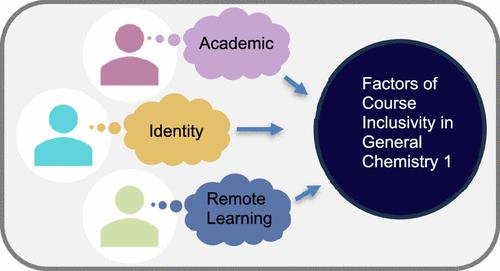当前位置:
X-MOL 学术
›
J. Chem. Educ.
›
论文详情
Our official English website, www.x-mol.net, welcomes your feedback! (Note: you will need to create a separate account there.)
A Mixed Methods Study Exploring Students’ Open-Ended Responses about Course Inclusivity in General Chemistry 1
Journal of Chemical Education ( IF 3 ) Pub Date : 2024-03-26 , DOI: 10.1021/acs.jchemed.3c00781 Dasha K. Walker , Vanessa P. Bustamante , Hannah E. Blomgren , Joshua D. Edwards , Regina F. Frey
Journal of Chemical Education ( IF 3 ) Pub Date : 2024-03-26 , DOI: 10.1021/acs.jchemed.3c00781 Dasha K. Walker , Vanessa P. Bustamante , Hannah E. Blomgren , Joshua D. Edwards , Regina F. Frey

|
This exploratory study uses a mixed-method approach to examine students’ perceptions of inclusion in a large first-semester General Chemistry course that occurred during Covid-19. In a survey given at the end of the semester, we asked students to rate their course inclusion and to provide an open-text explanation of their score. Qualitative analysis of these responses led to the development of primary categories comprising Academic, Identity, Nonspecific, Lack of Understanding, and Remote Learning. Overall, Academic, Remote Learning, and Nonspecific were the top reasons students gave for their level of inclusion. The Remote-Learning category contained phrases about remote-learning, zoom, or Covid-19 and then contained a second idea describing the reason for the student’s level of inclusion, leading to Remote-Learning subcategories. These subcategories were similar to the other primary categories and Academic subcategories. A majority of the responses (55%) cited academic factors such as interactions among peers, interactions between students and instructors, or course structure. Overall, our exploratory findings suggest that instructors have much influence over factors influencing student perception of inclusion in their General Chemistry 1 classrooms.
中文翻译:

一项混合方法研究,探索学生对普通化学课程包容性的开放式反应 1
这项探索性研究采用混合方法来调查学生对参加 Covid-19 期间发生的第一学期大型普通化学课程的看法。在学期结束时进行的一项调查中,我们要求学生对他们的课程进行评分,并提供对其分数的开放文本解释。对这些反应的定性分析导致了主要类别的发展,包括学术、身份、非特定、缺乏理解和远程学习。总体而言,学术、远程学习和非特定是学生给出的包容程度的首要原因。远程学习类别包含有关远程学习、zoom 或 Covid-19 的短语,然后包含第二个想法,描述学生参与程度的原因,从而形成远程学习子类别。这些子类别与其他主要类别和学术子类别类似。大多数回复(55%)引用了学术因素,例如同伴之间的互动、学生和教师之间的互动或课程结构。总体而言,我们的探索性发现表明,教师对影响学生对普通化学 1 课堂包容性的看法的因素有很大影响。
更新日期:2024-03-26
中文翻译:

一项混合方法研究,探索学生对普通化学课程包容性的开放式反应 1
这项探索性研究采用混合方法来调查学生对参加 Covid-19 期间发生的第一学期大型普通化学课程的看法。在学期结束时进行的一项调查中,我们要求学生对他们的课程进行评分,并提供对其分数的开放文本解释。对这些反应的定性分析导致了主要类别的发展,包括学术、身份、非特定、缺乏理解和远程学习。总体而言,学术、远程学习和非特定是学生给出的包容程度的首要原因。远程学习类别包含有关远程学习、zoom 或 Covid-19 的短语,然后包含第二个想法,描述学生参与程度的原因,从而形成远程学习子类别。这些子类别与其他主要类别和学术子类别类似。大多数回复(55%)引用了学术因素,例如同伴之间的互动、学生和教师之间的互动或课程结构。总体而言,我们的探索性发现表明,教师对影响学生对普通化学 1 课堂包容性的看法的因素有很大影响。



























 京公网安备 11010802027423号
京公网安备 11010802027423号